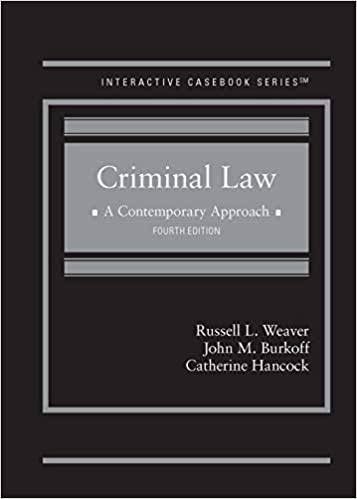Question
Viola Johnson, a black nursing assistant, was hired to work at Heavenly Care (HC), a nursing home located in Alabama. HC had nursing homes in
Viola Johnson, a black nursing assistant, was hired to work at Heavenly Care ("HC"), a nursing home located in Alabama. HC had nursing homes in five states and employed over 100 workers. Johnson was exceptionally qualified, with a stellar work history and great references. At the time she was hired, Johnson was told that her position would be permanent.
Shortly after Johnson was hired, several white residents complained about Johnson being black, and stated that they only wanted white assistants assigned to them. Accordingly, HC posted a list of residents who had made requests for white assistants only with the notation next to them: "NO BLACK ASSISTANTS!" and instructed Johnson that she was not to attend to those residents. This policy impacted the number of hours that Johnson could work at HC, including that she was unable to work enough hours to entitle her to the same overtime pay that many of Johnson's white co-workers were able to receive.
In addition to being instructed not to assist certain residents, Johnson became extremely uncomfortable as the result of certain conduct of her co-workers. There was a lot of sexual banter that Johnson felt was inappropriate, and some of her male co-workers regularly would leave copies of sexually-explicit magazines lying open in the break room. Johnson didn't tell anyone at the time that she was uncomfortable about this behavior because she was new and didn't want to be viewed as a complainer.
Three months after she was hired, Johnson filed a complaint with the Equal Employment Opportunity Commission ("EEOC") claiming that she was being subjected to racial discrimination. One day after learning that Johnson had filed a complaint with the EEOC, HC fired her. Johnson was replaced with a white employee.
Johnson obtained a right to sue letter from the EEOC and thereafter filed a lawsuit alleging that that HC had violated her rights under Title VII of the 1964 Civil Rights Act, had wrongfully terminated her because she was promised that her employment would be permanent, and had subjected her to sexual harassment. HC defended, asserting that Johnson was an at-will employee, that the restriction on which residents she could assist was a Bona Fide Occupational Qualification ("BFOQ") because HC was honoring its residents' right to choose their medical providers, that HC could not be liable for any alleged sexual harassment, and that Johnson was not fired because she was black or because she had filed a complaint with the EEOC, but because she had used profanity in front of a resident.
DISCUSS THE LIKELY RESULT OF JOHNSON'S LAWSUIT AGAINST HC. BE SURE TO DISCUSS ALL OF JOHNSON'S POTENTIAL CLAIMS AS WELL AS EACH OF HC'S POTENTIAL DEFENSES.
Step by Step Solution
There are 3 Steps involved in it
Step: 1

Get Instant Access to Expert-Tailored Solutions
See step-by-step solutions with expert insights and AI powered tools for academic success
Step: 2

Step: 3

Ace Your Homework with AI
Get the answers you need in no time with our AI-driven, step-by-step assistance
Get Started


